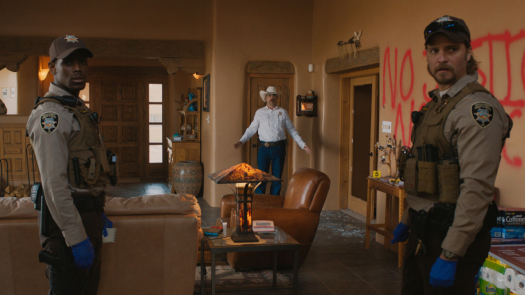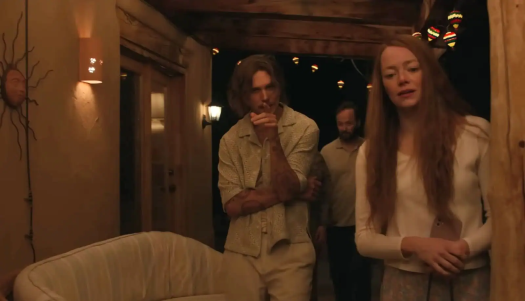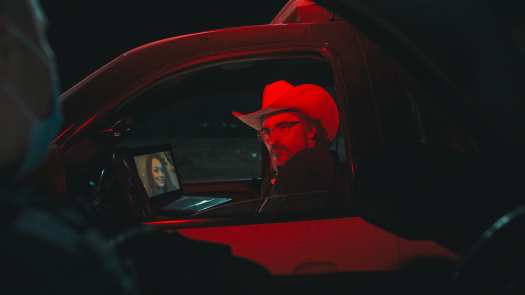My review of any Ari Aster movie is going to be “I liked it, but I can’t really recommend it to almost anyone.” Hereditary is his most normal of films, being essentially a remake of Rosemary’s Baby, with emphasis on moody anxiety and shocking gore. I consider Beau is Afraid to be a masterpiece surreal picaresque but I can’t blame people for not wanting to spend three hours in anxiety for entertainment purposes.
Well, if you like anxiety, and you especially like it when it hits close to home and reminds you of a bunch of real-world unpleasant experiences, let me tell you: Eddington is the movie for you.
The plot, ostensibly, is that normal, none-too-bright sheriff (Joaquin Phoenix in the most normal role I’ve seen him in since Signs) is fed up with also none-too-bright establishment stooge mayor (Pedro Pascal in the kind of role he shines in), and so decides to run against him for mayor, immediately turning the sheriff’s office into his makeshift campaign HQ (which can’t possibly be legal). Well, it’s a small town, so as it turns out the sheriff’s (mysteriously sexually traumatized) wife (Emma Stone) used to date the sheriff when she was sixteen, and the sheriff’s wife vanished years ago, while his son is getting to BLM activism because the one cute white girl in Eddington is an activist, organizing road blocks and apologizing for her privilege.

“Six feet!” Joaquin reminds Pedro, even though he doesn’t believe in any of it.
Actually, every white young adult in the movie punctuates every thing they say with apologies for being white. Even at a prominent funeral, the eulogizers apologize for daring to speak on “stolen land”. The mayor is a self-serving jerk, but the sheriff is an impetuous idiot who wrecks his own life by trying to tie his wife’s trauma to his candidacy.
This ushers in the end of the second act, when the sheriff’s impulsive nature gets the better of him, and the third act ratchets into increasing insanity and violence.
But Is It Any Good?
The Boy liked it. The Barbarienne gave it 9 out of 10 (which may be her lowest rating). Me?
Well, “good” or not, I wouldn’t recommend this movie to most people. Like, in the beginning of the movie when the sheriff (who is asthmatic) rolls out to the grocery store, and reminds the grocery store bouncers (remember those?) that they don’t really have the authority to police masking, and everyone’s standing six feet apart waiting to get in, and nobody’s wearing a mask properly anyway, but everyone’s talking about all the death caused by Covid-19 (or is it?)—there’s no denying that Aster captures the insanity of the lockdown/masking period.
There’s also no denying that the events of the movie, which has everyone scrolling their devices constantly, and seeing stories about murder hornets, pedophile rings, etc., go by, reflect the distracted, sanity-baiting life a la mode.

Actually, the entire movie is populated by morons and madmen.
The small scope of the film works as a perfect satire. There is one homeless guy who wanders around. He’s genuinely a menace but there’s not really anything anyone can do for him or to him, and he ends up being the catalyst for the sheriff’s denouement. (Keep the word “denouement” in mind. It’s going to come back.) The BLM protests block a road, but there’s really no reason for anyone to care about it. There’s no traffic on the road, and the town appears to be largely deserted. (The Mayor’s son mocks the Sheriff for driving around yelling out his campaign promises to, essentially, no one.)
The sheriff’s crazy mother-in-law (Deirdre O’Connell) watches a constant feed of conspiracy theories, and her ultimate fate is clearly meant to be satirical—it doesn’t make any actual sense—but I didn’t feel like this was a political film. If it was, it fails at that, and (ironically?) it might have been a better film if it had been political.
Ad Aster
As my children pointed out, this is an Ari Aster film, and as such things that I view as its failings are probably my own in having the wrong expectations.

Your wife, introducing you to the cult leader she’s about to allow to impregnate her.
To me, the brilliance of Beau is Afraid is the largely agency-free Beau struggles to survive and manages, ultimately, to gain some control over an existence which is literally insane. I don’t mean that he’s insane; I mean the world is insane. It is, at times, out to get him, and if we take his struggle literally (or maybe even if only metaphorically), his willingness to forge on become increasingly admirable. In this framework, the indignities and absurdities of the world are not just encouraging us to point-and-laugh.
Here, the Sheriff has apparent agency, but this is largely thwarted by his own impulsiveness. By the end of Act II, he does something to set himself on a path that goes increasingly out-of-control. The movie is over at that point, and the last hour is just a depiction of his descent—the denouement, in other words is a full hour before the end of the movie.
So, while the proceedings were often entertaining—e.g., a Kyle Rittenhouse callback where a young man saving the Sheriff’s life has his phone in one hand and a gun that he’s filming while he’s firing it in the other—they were dramatically pointless. There was nothing to be learned, and no one to root for, unless one wants to root for “mere anarchy”.
I expected better emotional resonance or, as I said, even a political message might have been welcome if just to explain why I sat there for two-and-a-half hours. Somehow, I expected more.

When the cops pull up to remind you to wear a mask. While sitting in a car. Alone. At the outskirts of town.
But I didn’t expect anything on the level of The Apartment or One Flew Over The Cuckoo’s Nest, which maybe is actually telling in itself.

One thought on “Eddington”